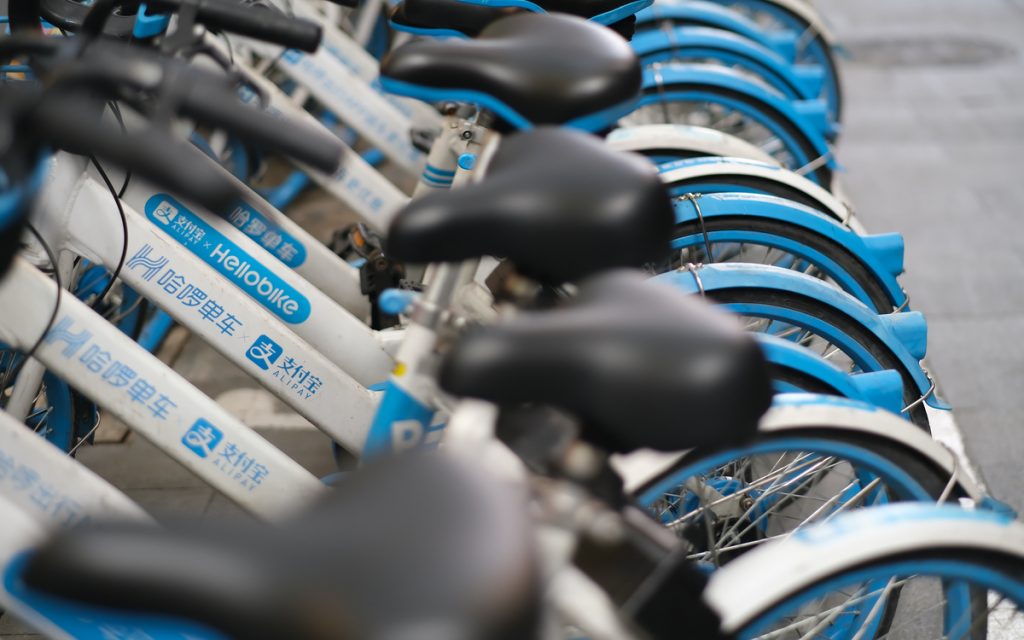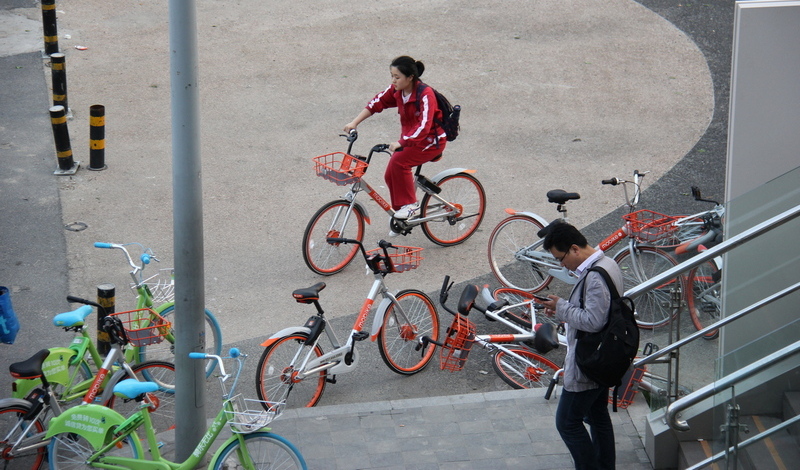There are more than 1250 companies in the world that offer 10 million bicycles for rent. Experts predict that this market will grow by 20% per year. The main trends and forecasts for the future – in the study of Roland Berger
China has been the main growth driver in bike sharing: 2.3 million bikes can be rented in Beijing, 1.7 million in Shanghai, and 890,000 in Shenzhen. York – 8 thousand.
In China, there are almost no legal restrictions on companies that operate in this area. At the same time, there are enough factories here to produce 80 million bicycles a year, and investors are ready to invest in such a business model, because they see good prospects.
Inspired by the success at home, the Asian players have already started their expansion into the European markets. For example, bicycles from the Chinese company Mobike can be found in London, Paris and Milan.

As the bike rental market grew, it saw its first setbacks. For example, in 2017, Bluegogo, which ranked third in the Chinese market, went bankrupt. And at the end of 2018, the Hong Kong Gobee was forced to leave the French market due to losses: thousands of its bikes were damaged or stolen. A similar situation occurred with Singapore’s Obike service in Munich, where bicycles were damaged during mass protests.
The Bicycle and Scooter Rental Market Research Report provides a pinpoint analysis of the elements that soon drive and control a business move. He considers the broader market situation of the day to finally register his true powers for the future. The Bicycle and Scooter Rental Market Report features a decent worldwide investigation, market size locally and nationally, divisional market development, piece of the pie, serious landscape, deals exam, homegrown and global market players effect, late turn of events, open doors Investigation , research on the development of key markets, shipment of items and mechanical development
This market research covers the global and regional market with an in-depth analysis of the overall growth prospects in the market. In addition, it sheds light on the overarching competitive landscape of the global marketplace. The Bicycle and Scooter Rental Market Report additionally offers a dashboard overview of leading companies covering their successful marketing strategies, market contributions and recent developments both historically and currently. The report also provides a detailed assessment of the market by highlighting information on various aspects which include drivers, constraints, opportunities and threats.
This information can help stakeholders make appropriate decisions prior to investing.
This year, the Chinese Mobike plans to launch a rental of 1,000 smart bikes in St. Petersburg. The company is already operating in 13 countries, and has attracted $1 billion in investments for development.
The Chinese bike-sharing service Mobike is coming to Russia and is looking for employees, follows from ads on the social network for finding business contacts LinkedIn. The vacancies indicate that the work will primarily be focused on St. Petersburg and other cities of Russia.
Representatives of Mobike have already applied to the St. Petersburg Transport Infrastructure Development Committee. “According to the information provided, Mobike plans to place 1,000 bicycles this year,” the committee said, noting that “we are ready to provide assistance within our competence.”
Mobike does not comment on which cities in Russia they plan to launch the service this year, explaining only that they are most interested in development in the largest metropolitan areas. This week the company took part in the Winter Cycling Congress in Moscow, warning from a poster on it: Coming to Russia. Mobike is now the largest bike rental service in the world. And it is fundamentally different from those systems that are already operating in Moscow and St. Petersburg.
Billions on wheels
Mobike was launched by former Uber executive in Shanghai David Wang, and the ease of use was soon dubbed Uber for bikes. It was from Shanghai in the spring of 2016 that the service started. In less than two years, the company already has 8 million bikes in 200 cities in 13 countries, including the UK, Germany, Italy, Japan, Italy, Singapore and Thailand. Users make 30 million daily rides on the company’s bikes. Mobike has raised $1 billion in investment since its launch.
Now in St. Petersburg, Moscow and other Russian cities there are network bike rentals with fixed stations where you need to park your bike. Each such parking lot has a “smart” lock that sends a signal to the system that the rental time is over. Mobike, on the other hand, uses “smart” locks not on parking lots, but on the bikes themselves. They do not need special parking – the user downloads the application, uses it to find a bike on the map and unlocks the lock. In Russia, a similar system has been operating since September last year only in Almetyevsk in Tatarstan, with a population of 150,000 people.
You no longer need a smartphone to end your trip on a smart bike, and you can leave the bike anywhere by locking the rear wheel on it. Sometimes Mobike sets up parking zones where you can find a bike, whether there will be such in St. Petersburg is unknown. In addition, the application has a system of fines and rewards so that users leave their bikes without breaking the rules and so that they do not interfere with anyone. The rules are there to avoid repeating the experience of China, where with the rapid development of Mobike and its competitors like Ofo, bikes often just piled up in popular places.
“Of course, there must be parking rules. We have many different methods that allow us to ensure that bicycles are always parked so that they do not interfere with anyone,” explains Stanislav Ivanov, General Manager of Mobike for Russia and the CIS.
Scale and competition
The cost of a Chinese “smart” bike is only $150-450, it was previously reported. The company itself does not disclose the cost of the bike, noting only that it is possible to save on production due to economies of scale.
The cost of one bike in a system with “smart” parking is about $5,000. Therefore, rental systems with fixed stations around the world are being developed with the participation of state subsidies or partnerships with corporations. Such bike rentals call themselves planned unprofitable. St. Petersburg is no exception, where the Velogorod network bike rental has been operating since 2014. For the first year, the company’s partner was the Bank of Moscow, and since 2015, the rental has been annually subsidized from the city budget – over 3 years the company received about 100 million rubles.

Reimbursement of costs was held according to the competition, but apart from Velogorod, no one participated in it – it was just that before that there were no companies with suitable parameters. Last year, the vice-governor of St. Petersburg, Igor Albin, expressed dissatisfaction with the work of the network, urging them to look for an alternative to Velogorod in order to create competition among rentals.
In the new season, Velogorod plans to expand the number of its stations in St. Petersburg from 90 to 140-160, and the number of bicycles according to the company’s plan will increase from 600 to 1-1. two bike-sharing systems. In Moscow, there are five car-rental systems, and they all get along together,” says Vitaly Blazhenov, general director of Velogorod.
Vitaly Blazhenov fears for the bicycles of his future competitor.
“Due to the specifics of our country, many of them will soon end up in someone’s dachas. Even from our stations last year, 17 bicycles were stolen, and a year earlier, when we were still working on the old system, 80 were stolen. At the same time, our bicycles are fastened to stations,” says Vitaly Vlazhenov.
In a Chinese company, such dangersno. “Whatever country we come to, they say that the specifics of their country is such that bicycles will be stolen. But in fact, this is an insignificant percentage,” says Stanislav Ivanov, “Besides, our bicycles stand out, they will be difficult to sell” .
